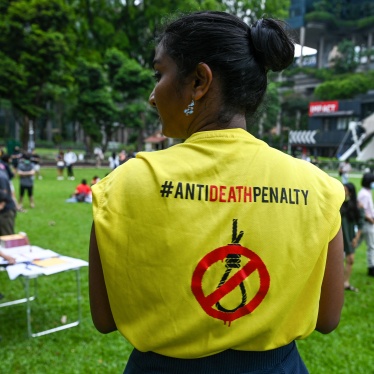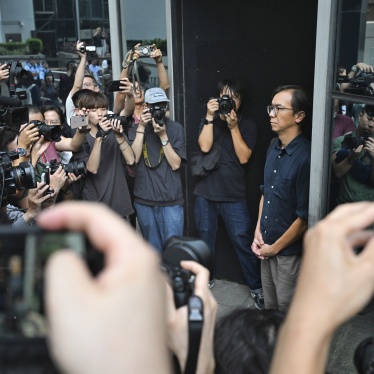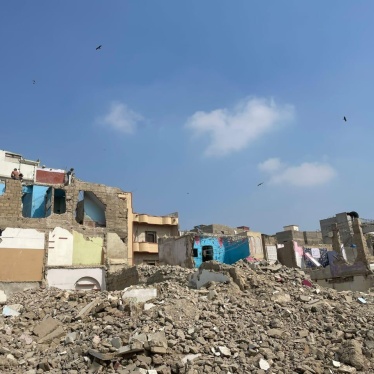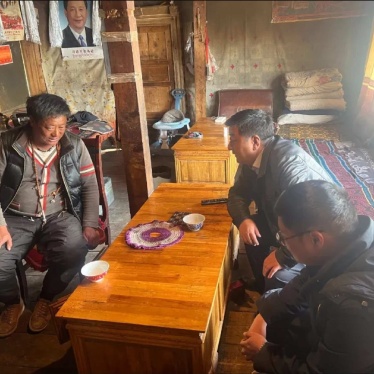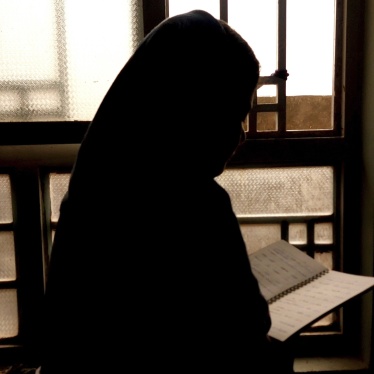Human Rights Watch welcomes the opportunity to make a submission on Australia’s advocacy to abolish the death penalty.
Human Rights Watch has long opposed the death penalty in all circumstances because of its inherent cruelty and irreversibility. The United Nations General Assembly’s (UNGA) December 2022 resolution, which has been adopted biannually since 2007 (and in 2022 was led by Australia and Costa Rica), called for a worldwide moratorium on the death penalty. It states, “that there is no conclusive evidence of the death penalty’s deterrent value” and acknowledged “that any miscarriage or failure of justice in the death penalty’s implementation is irreversible and irreparable.”
Our submission looks at two issues – bilateral engagement and police cooperation.
Bilateral engagement
In June 2018, the Australian government published its Strategy for the Abolition of the Death Penalty. In accordance with this 2018 strategy, the Australian government has engaged in multilateral advocacy – for example at the UNGA, the UN Human Rights Council (HRC) and through the Universal Period Review (UPR) process. Australia’s strong engagement in these spaces is to be welcomed, but to be most effective it should be backed up with strong, public and consistent bilateral engagement, which appears to have been missing from Australia’s approach to date.
The government’s 2018 strategy makes a commitment that “[d]iplomatic and consular missions, in collaboration with geographic desks and other relevant government agencies, will develop and implement tailored strategies for engaging with countries of accreditation that retain the death penalty in any form,” however, the document also states, “[i]n the majority of cases, our representations will be private.”
This deference to private representations risks being ineffectual, and means there is no way to hold the Australian government and other governments to account. As a result of the majority of Australia’s advocacy being private, the public sees very few statements from Australian embassies or the Foreign Ministry calling out specific governments about the use of the death penalty. This approach lacks transparency and there is no way to be sure the issues are being raised by Australian officials.
For progress to be achieved there needs to be sustained political pressure in raising the death penalty at every opportunity unless a risk assessment determines that public advocacy will do more harm than good. This means public commentary by the Australian embassy when people are sentenced to death and raising cases during visits to countries retaining the death penalty by Australian government ministers, politicians and senior officials. It also means that Australian officials stationed in embassies or on official travel should regularly meet with death penalty opponents, and families of those sentenced to death and take steps to support them when governments try to silence their voices.
Below we give three examples where the Australian government can and should be engaging in more public advocacy – Singapore, Vietnam and China.
Singapore
Last year, the Singaporean authorities carried out the highest number of executions for drug-related offences in over a decade, including the first woman put to death in almost 20 years. The Singaporean government also has a track record of silencing and intimidating opponents of the death penalty.
Australia and Singapore have annual leaders’ meetings, yet the death penalty has never been raised publicly in any of those meetings even when executions in Singapore have occurred immediately before the leaders’ summit. This is a missed opportunity for the Australian government to convey its concerns about executions.
- On October 7, 2022, the Singaporean authorities executed an unidentified 55-year-old Singaporean man. Less than two weeks later, the Australian government hosted the 7th Australia-Singapore Annual Leaders’ Meeting in Canberra inviting the prime minister of Singapore. In Prime Minister Anthony Albanese’s media statement following the summit, there was no mention of the death penalty (or any other human rights issues).
- In May 2023, the Singaporean authorities executed a Malay Singaporean man who had been convicted of trafficking 1.5 kilograms of cannabis. Yet two weeks later, in June 2023 following the 8th Australia-Singapore Annual Leaders’ Meeting, this time held in Singapore, there was no mention of the death penalty by Prime Minister Albanese. The following month, the Singaporean authorities executed two more people.
- On February 29, 2024, Singaporean authorities executed a 35-year-old Bangladeshi migrant worker charged with the murder of his former partner. Less than a week later, on March 5, 2024, at the 9th Annual Leaders’ Meeting in Australia, the death penalty was not publicly raised by the Australian government. Even if it was raised privately by Australia, there was no evident impact. Since April 12, 2024, the Singaporean government has issued at least four execution notices to individuals convicted of drug-related offences. The individuals were among a group of 36 death-row prisoners taking part in a legal action relating to their constitutional right to legal aid following appeal.
Vietnam
Vietnam’s use of the death penalty is significant and opaque. The government does not publicly share information regarding who is on death row, how many people are being executed, and on what charges. It has fallen on journalists to try and piece this information together. According to one journalist report, “[e]very year, Vietnam executes more citizens than any other country in Southeast Asia; it also houses the highest number of death row inmates in the region.” According to state media Dan Tri, between October 2018 and September 2019, Vietnam executed 68 death-row inmates. In September 2023, Vietnam executed death-row inmate Le Van Manh despite serious irregularities in the investigation and multiple trials.
Yet despite this, and despite the existence of an annual Australia-Vietnam human rights dialogue, Australia has never set public benchmarks with Vietnam to abolish the death penalty. While at times the death penalty has been mentioned in Australian government statements following the dialogue, including the most recent one in July 2024, these meetings have failed to have a demonstrable impact on Vietnam’s use of the death penalty.
China
The Chinese government is believed to carry out the most executions compared to any other country in the world. However, it is impossible to obtain precise data on China’s execution rates as it is considered to be a state secret. The Chinese judicial system is notoriously opaque, with no due process or fair trial rights. In fact, the conviction rate in China is 99.9 percent.
Australian Foreign Minister Penny Wong spoke out when a Chinese court handed down a suspended death sentence to the Australian citizen Dr. Yang Hengjun. These public condemnations are very important, but it is also crucial that the Australian government speaks out against the death penalty in China regardless of whose life is at stake. Given that the judicial system in China lacks even basic procedural protections, calling out the death penalty strongly on a case-by-case basis is valuable, but it is also important to use this advocacy to amplify Australia’s concern for all people on death row in China.
Police cooperation
The Australian government’s 2018 strategy does not cover government-to-government assistance or police cooperation in a death penalty context.
This is significant because police cooperation between Australia and other countries is often in relation to drug trafficking cases. Drug trafficking is punishable by death in some of the countries where this police cooperation exists such as Myanmar, Indonesia, and China.
According to the current system implemented by the Australian Federal Police (AFP), where there is to be “any exchange of information or a potential issue [that] relates to the death penalty, that would be a trigger to escalate it to the sensitive investigations board.” This oversight board is within the AFP and has no DFAT representative nor any external lawyer or human rights expert on it. This means they are not seeking (and are not required to seek) expert advice from outside of the AFP. External advice is crucial in this context as it would provide a broader perspective than the AFP’s focus on disrupting crime and preventing drug imports.
Given the high stakes, it is crucial that police cooperation is considered through the lens of the government’s 2018 strategy and has mandatory external and human rights oversight. Without this, there is a serious risk that Australian police could cooperate with a foreign police force in a way that leads to someone being convicted and executed.
Myanmar
Australian police cooperation with the Myanmar junta is a useful example. Myanmar retains the death penalty for serious drug offences such as drug trafficking. Questioning in Senate Estimates in May 2023 revealed that between February 2021 and May 2023, the AFP provided 296 pieces of intelligence relating to drug exportation from Myanmar to Myanmar police. The inherent risk for anyone who is convicted of a serious drug offence in Myanmar on the basis of such evidence is clear.
Even more concerning, however, the AFP did not elevate any of the 296 pieces of intelligence to their oversight board. This means that the AFP shared information with Myanmar junta authorities on matters that had the potential to result in a death sentence without getting it checked first by an oversight board. It is not clear why these matters never made it to the oversight board, nor what process the oversight board undertakes to ensure that any decisions are consistent with human rights standards.
Recommendations to the Australian government:
- Continue to engage in multilateral fora to work with other countries from different regions towards the global abolition of the death penalty, including at the UNGA, UNHRC and through the UPR.
- Speak out publicly against the use of the death penalty during all bilateral engagements, setting measurable benchmarks for progress.
- Department officials and government representatives should prioritise death penalty advocacy in countries where there are concerns about fair trials and due process, especially in countries that use torture to extract confessions.
- Instruct embassies to regularly and consistently speak out on death penalty cases, and ensure visiting leaders and politicians meet with death penalty opponents, and families of those sentenced to death and take steps to support them when governments try to silence their voices.
- With governments that retain the death penalty, set benchmarks for the abolition of the death penalty.
- DFAT should draft an annual public report naming the countries retaining the death penalty and providing regular updates on usage, cases, and steps towards a moratorium or reducing executions.
- Update the 2018 strategy for abolition of the death penalty to include government-to-government assistance and police cooperation in a death penalty context. At the very least, any Australian police and government oversight board should include a government human rights specialist. There should be no police cooperation in cases where there is a risk that someone may face the death penalty.
- Continue to enhance local efforts in other countries to end or reduce the death penalty by supporting civil society initiatives, lawyers’ groups, and others working to end the death penalty.
